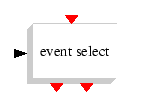Subsections
Event select
Events
Special block similar to If-Then-Else. Input and output are
synchronized. The incoming event is directed to one of the output
event ports depending on the value of the regular input.
| Set ESELECT block parameters |
|
| number of output event ports |
2 |
| Inherit (1: no, 0: yes) |
1 |
| zero-crossing (0: no, 1: yes) |
0 |
- number of output event ports: integer
- Inherit : 0 or 1; 0 means inheritance so the block has no input
activation port
- zero-crossing : should zero-crossing be used if the block is
continuously active.
- always active: no
- direct-feedthrough: no
- zero-crossing: no
- mode: no
- number/sizes of inputs: 1 / 1
- number/sizes of outputs: 0 /
- number/sizes of activation inputs: 1 / 1
- number/sizes of activation outputs: 2 / 1 1
- continuous-time state: no
- discrete-time state: no
- name of computational function: eselect
scilab/macros/scicos_blocks/branching/ESELECT_f.sci
subroutine eselect(flag,nevprt,ntvec,rpar,nrpar,ipar,nipar,u,nu)
c Scicos block simulator
c if-then-else block
c if event input exits from then or else clock ouputs based
c on the sign of the unique input (if input>0 then else )
c
c Copyright INRIA
double precision rpar(*),u(*)
integer flag,nevprt,nx,nz,ntvec,nrpar,ipar(*)
integer nipar,nu
c
integer iu
c
common /dbcos/ idb
c
if(idb.eq.1) then
write(6,'(''ifthel t='',e10.3,'' flag='',i1)') t,flag
endif
c
iu=max(min(int(u(1)),ipar(1)),1)
if(flag.eq.3) then
ntvec=iu
endif
end
Ramine Nikoukhah
2004-06-22

